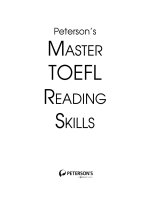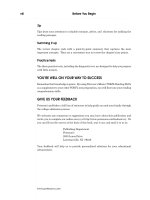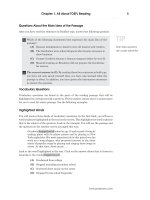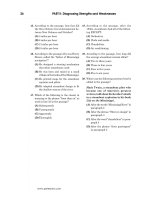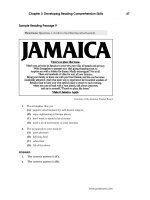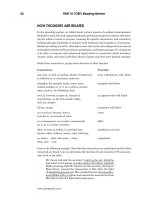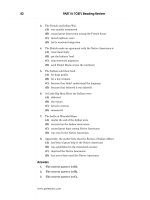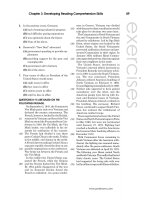Peterson’s master toefl writing skills part 10 pps
Bạn đang xem bản rút gọn của tài liệu. Xem và tải ngay bản đầy đủ của tài liệu tại đây (82.18 KB, 7 trang )
Skill Builder 14: Cause and Result
Directions: Write a “C” on the line if the sentence is correct. Write an “X” on the line
if there is an error in the cause-and-result clause.
1. They had so a good meal at that restaurant that they wanted to go there again.
2. They were such talented actors that their movie was a great success.
3. The store had too few customers that it closed.
4. It was such a long lesson that we could not finish it in one day.
5. He was as rich that he owned four homes.
6. He is so forgetful as he never pays his rent on time.
7. She was such a good student that she won a scholarship.
8. They had a such bad day that they got depressed.
9. It was so warm weather that we went to the swimming pool.
10. The old woman’s handwriting was so faint that I could hardly read it.
11. The stars are so far from the earth that we cannot see most of them.
12. I had too many things to do that I could not finish them all.
13. It was so confusing as I could not understand it.
14. He spoke such good Arabic that he surprised everyone.
15. The building was as large that we had difficulty finding his office.
Answers
X
1. (so good a meal) OR (such a
good meal). See pattern 3a.
C
2.
X
3. (had so few customers that).
See pattern 1c.
C
4.
X
5. (was so rich that). See
pattern 1a.
X
6. (so forgetful that). See
pattern 1a.
C
7.
X
8. (had such a bad day that) OR
(had so bad a day that). See
pattern 3.
X
9. (was such warm weather
that). See pattern 2.
C
10.
C
11.
X
12. (had so many things to do
that). See pattern 1c.
X
13. (so confusing that). See
pattern 1a.
C
14.
X
15. (so large that). See
pattern 1a.
52 PART III: TOEFL Writing Review
www.petersons.com
ARTICLES
1. Use a or an with an unspecified singular count noun. Use an before a word that begins
with a vowel or a vowel sound.
I saw a puppy in the park yesterday.
The woman asked for an exact count.
He is an honest man.
2. Use the with specified singular and plural count nouns.
The puppy I saw in the park was black and white.
The engineers from Clearwater Company designed a new system for water
purification.
3. Do not use an article with plural count nouns used in a general sense.
Dogs make good pets.
Astronauts go through rigorous training programs to prepare for space flights.
4. Do not use an article with non-count nouns used in a general sense.
I do not like seafood.
Honesty is the best policy.
Error Examples
WRONG: We went to the store and bought new stove.
RIGHT: We went to the store and bought a new stove.
WRONG: Everyone should have a equal opportunity to get an education.
RIGHT: Everyone should have an equal opportunity to get an education.
WRONG: They had an accident in new car they bought last week.
RIGHT: They had an accident in the new car they bought last week.
WRONG: It is traditional to have the flowers at a wedding.
RIGHT: It is traditional to have flowers at a wedding.
WRONG: The honesty is a virtue.
RIGHT: Honesty is a virtue.
Chapter 3: Modifiers 53
www.petersons.com
Skill Builder 15: Articles
Directions: Write a “C” on the line if the sentence is correct. Write an “X” on the line if
there is an article mistake.
1. John’s friends had a farewell party for him last Friday.
2. He tried hard to get good grade on the test.
3. It is always difficult to make the decisions.
4. When he lived in Paris he went to parties every weekend.
5. They gave me a electric typewriter for my birthday.
6. Paul began to think that he would never find the happiness.
7. The old man no longer believed that money was the most important thing in life.
8. He wanted to try on pair of jogging shoes at the shoe store.
9. In all his life he had never wanted to try the wine.
10. She does not have an understanding of the subject yet.
11. I just saw boys from Africa that I met at the International House party last
week.
12. Teachers usually spend many hours correcting papers.
13. Some people believe that the frankness is the best policy in any situation.
14. The man who fixed my air-conditioning unit accidentally broke the fan.
15. The doctors have to go to school for many years to complete their education.
Answers
C
1.
X
2. (a good grade). See rule 1.
X
3. (to make decisions). See rule 3.
C
4.
X
5. (an electric typewriter). See
rule 1.
X
6. (find happiness). See rule 4.
C
7.
X
8. (on a pair of jogging shoes).
See rule 1.
X
9. (to try wine). See rule 4.
C
10.
X
11. (saw the boys). See rule 2.
C
12.
X
13. (that frankness is). See rule 4.
C
14.
X
15. (Doctors have to go). See rule 3.
54 PART III: TOEFL Writing Review
www.petersons.com
TOO, VERY, AND ENOUGH
Compare the meanings and patterns of too, very, and enough:
1. Very means to a high degree, but does not suggest impossibility or undesirability.
Mary is very intelligent.
VERY 1 ADJ.
2. Too suggests impossibility or undesirable degree.
She is too sick to come
TOO 1 ADJ. 1 TO 1 V
to class today.
3. Enough suggests possibility or sufficient degree.
He is tall enough to play
ADJ. 1 ENOUGH 1 TO 1 V
basketball.
a. In patterns 2 and 3 above, do not use any other structure word after the
adjective or adverb except to.
b. In the above patterns adverbs can be used in the same position as
adjectives. Example: Mary sings very well.
c. Enough can come before or after a noun to express sufficiency.
He had money enough to buy a new car.
OR
He had enough money to buy a new car.
Error Examples
WRONG: This meat is too delicious.
RIGHT: This meat is very delicious.
WRONG: It was very late to catch the plane.
RIGHT: It was too late to catch the plane.
WRONG: He was enough old to get a driver’s license.
RIGHT: He was old enough to get a driver’s license.
WRONG: His English was enough good as for him to pass the TOEFL.
RIGHT: His English was good enough for him to pass the TOEFL.
WRONG: We had very much time to finish our work.
RIGHT: We had enough time to finish our work.
NOTE
Be careful to put
enough AFTER the
adjective.
Be careful to put
to 1 V (infinitive)
AFTER enough.
Chapter 3: Modifiers 55
www.petersons.com
Skill Builder 16: Too, Very, and Enough
Directions: Write a “C” on the line if the sentence is correct. Write an “X” on the line if
there is an error with too, very,orenough.
1. I had enough experience to get the job.
2. This soup is too good.
3. It was too late to go to the theater.
4. He is enough intelligent to do well in school.
5. Paul had very much money to buy a new motorcycle.
6. I am very disappointed in his behavior.
7. He made too many good friends when he studied abroad.
8. She spoke French well enough to be a translator.
9. He did not speak English as well enough to be understood.
10. The envelope was thin enough to slide under the door.
11. The sofa was big enough as to seat four people comfortably.
12. This paragraph is not enough good as to be acceptable.
13. His TOEFL score was high enough to be accepted.
14. She was too happy when she heard the news.
15. She was enough old to get married.
Answers
C
1.
X
2. (very good). See rule 1.
C
3.
X
4. (intelligent enough). See
rule 3a.
X
5. (had enough money). See
rule 3c.
C
6.
X
7. (made many good friends).
See rule 2.
C
8.
X
9. (English well enough). See
rule 3c.
C
10.
X
11. (big enough to seat). See
rule 3c.
X
12. (good enough to). See rule 3.
C
13.
X
14. (very happy). See rule 1.
X
15. (old enough). See rule 3a.
56 PART III: TOEFL Writing Review
www.petersons.com
NEGATION
1. Not is an adverb that negates verbs. Not is used in the following patterns:
n auxiliary 1 not 1 V 1 ing
He is not going
AUX. 1 NOT 1 V 1 -ING
to the party.
He is not making
AUX. 1 NOT 1 V 1 -ING
any money.
n auxiliary 1 not 1 V
He does not like
AUX. 1 NOT 1 V
to study on the weekends.
We do not want
AUX. 1 NOT 1 V
any coffee, thank you.
n auxiliary 1 not 1 past participle
He has not been
AUX. 1 NOT 1 PAST PART.
here for days.
They have not seen
AUX. 1 NOT 1 PAST PART.
any deer.
n modal* 1 not 1 V
We will not accept
MODAL 1 NOT 1 V
your opinion.
You should not eat
MODAL 1 NOT 1 V
too many sweets.
2. No is an adjective that indicates the absence of something. It modifies nouns. It is
used in the following pattern:
n Verb 1 no 1 noun
There is no charge
V 1 NO 1 N
for towels at the pool.
He has no passport.
V 1 NO 1 N
3. None is a pronoun meaning not any or not one. Use none when the noun it replaces
has been mentioned already.
The children ate all the cookies. When I arrived, there were none
PRON.
left. (none 5 no
cookies)
They asked me to contribute some money but I had none
PRON.
.(none 5 no money)
None may also be used in the following pattern:
n None 1 of the 1 noun
In this pattern, the noun that none refers to is placed after of the.
When I arrived, none of the cookies
PRON. 1 OF THE 1 N
were left.
None of the children
PRON. 1 OF THE 1 N
know how to swim.
* For an explanation of modals, see the section in Chapter 4, “Verbs”—Verbs of “Demand”
on page 70.
Chapter 3: Modifiers 57
www.petersons.com
4. Remember to use any after negative words to express the absence of quantity for
plural count nouns and non-count nouns. (Anyone, anybody, anywhere, anymore, and
anything can also be used in negative sentence constructions.)
Idonot
NEG.
have any
ANY
free time
NCN
today.
There were not
NEG.
any
ANY
students
PL. CN
from China this year.
He does not
NEG.
go to school anymore
ANYMORE
.
We did not
NEG.
see anyone
ANYONE
leave the building.
5. There are some words that have negative meanings even though they do not appear to
be negative, for example: hardly, scarcely, rarely, seldom, without, and only. Do not use
another negative word with these words. (See notes.)
He had scarcely
NEG.
enough money for the bus.
They went to bed without
NEG.
dinner.
6. Negative infinitives (to 1 V) are formed by putting not before the infinitive (not 1 to 1 V).
She said not to talk
NOT 1 TO 1 V
during the program.
They told us to relax and not to worry
NOT 1 TO 1 V
.
7. Remember that no longer is an idiomatic negative expression of time.
He no longer lives here.
They no longer play golf together.
a. To express a negative idea, use only one negative word.
b. Never use not longer when longer means time.
Error Examples
WRONG: He is no going on vacation this summer.
RIGHT: He is not going on vacation this summer.
WRONG: There is not butter in the refrigerator.
RIGHT: There is no butter in the refrigerator.
WRONG: There were none children at the playground.
RIGHT: There were no children at the playground.
WRONG: We do not have no class Friday.
RIGHT: We do not have any class Friday.
WRONG: They seldom do not go to the movies.
RIGHT: They seldom go to the movies.
WRONG: I encourage you to do not wait for him.
RIGHT: I encourage you not to wait for him.
58 PART III: TOEFL Writing Review
NOTE
Two negative
words in one
sentence make
the sentence an
affirmative
statement; for
example, “Do not
leave without an
umbrella.” (“Be
sure to take your
umbrella.”)
www.petersons.com

